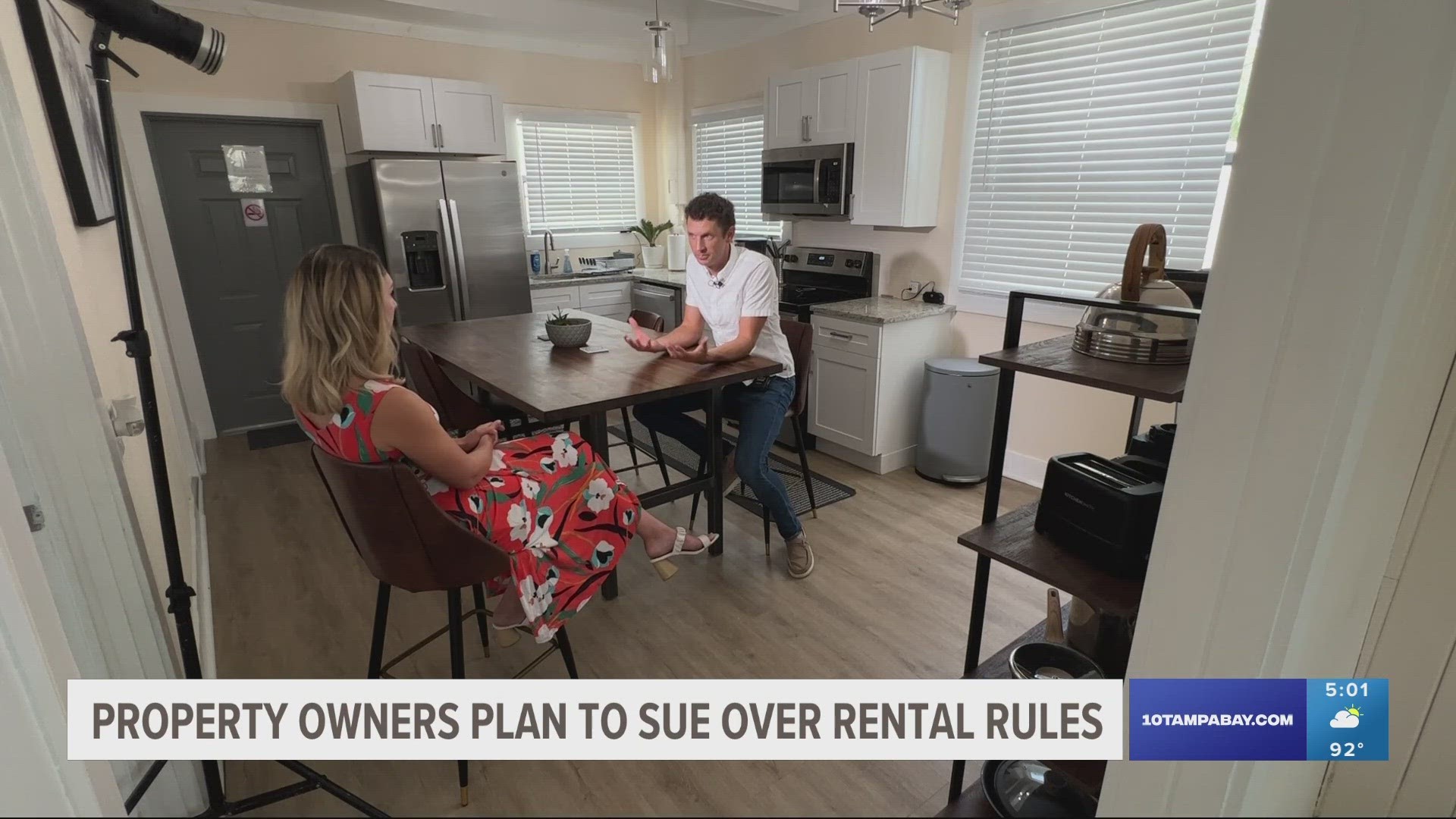INDIAN ROCKS BEACH, Fla. — In one week, a new city ordinance goes into effect in the city of Indian Rocks Beach regulating how short-term rentals, like Airbnb's and VRBOs, can operate in the city.
The ordinance created a divide in the small beach town. While the topic was debated in city commission meetings, residents posted yard signs on their lawns that read, "Homes not Hotels." Those in support of short-term rental properties posted signs that read, "IRB ♡'s Tourists."
Now, with the new ordinance just days away from going into effect, a group of more than 300 people has begun the legal process of suing the city over the ordinance.
"We've filed a demand letter with the city, which, in short, there's a process of filing, basically [it's] the intent to file a lawsuit against the city using a couple of different laws that were recently signed into effect," Matthew Barrowclough said.
Barrowclough owns four short-term rental property units in Indian Rocks Beach. He also lives in the city part-time. He and hundreds of others say the new ordinance is an overreach of local government.
The new ordinance does a handful of things, including requiring short-term rentals to be up to the current Florida Building Code, regardless of when the home was built.
"It's pretty egregious," Barrowclough said. "You know, this home is built in 1947. We've done a tremendous amount of work to get this home up to great standards and livable."
Barrowclough showed one of his rentals. He said the home was flooded when he bought it. It had animal and insect infestations. The home was renovated and all new appliances were installed, as well as new flooring. If the home has to be modified to meet the current code for new builds, Barrowclough can't afford to be in compliance.
"The requirements to build a home are very, very different today than they were in 1947," He said. "[It] adds a tremendous cost."
In the demand letter sent to the city of Indian Rocks Beach, "the Ordinance requires our residences to comply with the current Florida Building Code and Florida Fire Prevention Code, even if those regulations did not previously apply. This provision requires us to expend significant funds on renovations, reconstruction, or demolition of some or all of our homes to bring them up to current Code even if we would not otherwise be required to."
The ordinance also sets the number of people who can stay in a short-term rental, with no more than 12 people allowed in any unit, regardless of the number of bedrooms or beds available.
It regulates the number of parking spaces that must be provided, and it more heavily enforces the city's quiet hours. Additionally, the ordinance requires each short-term rental property to have a designated person available 24/7 to respond to complaints or remedy concerns within an hour.
"We want full repeal," Barrowclough said. "We're looking to protect our rights here, we're looking to protect the rights of every other homeowner here in the city and in the state of Florida."
10 Tampa Bay reached out to the city of Indian Rocks Beach for a statement on the demand letter.
"The City of Indian Rocks Beach does [not] comment on potential litigation," Gregg Mimms, the city manager wrote in an email. "The City is in receipt of a letter setting forth potential claims. We are evaluating the merits of those claims and our options. The City will have no other comment on the matter at this time."
While the city considers its options, the short-term rental owners are prepared to file their suit. A portion of the demand letter reads, "We demand that the City suspend enforcement of and repeal the Ordinance. Absent those actions, we will file suit against the City to obtain judicial relief. We don’t believe the City will meet our demands, so we have been preparing to file our suit."
The issues outlined in the letter called the ordinance "draconian" and "unreasonable." The letter cites recently passed Florida legislation, SB 250, as a reason to consider the ordinance illegal. The letter is asking the ordinance be suspended immediately, through another recently passed law, SB 170.
"SB 170 creates Section 116.0411, Florida Statutes which provides that a 'municipality must suspend enforcement of an ordinance that is the subject of an action challenging the ordinance’s validity on the grounds that it is expressly preempted by the State Constitution or by state law or is arbitrary or unreasonable' as long as certain filing and service requirements are satisfied," the demand letter stated.
The new ordinance goes into effect on Aug. 1. Unless the city responds to the demand letter for repeal, the lawsuit against the city will be filed the same day.
10 Tampa Bay reached out to the Pinellas County Sherrif's office Monday morning to learn how many calls and citations they've made regarding noise complaints and parking in Indian Rocks Beach. They have not fulfilled our request.
Malique Rankin is a general assignment reporter with 10 Tampa Bay. You can email her story ideas at mrankin@10tampabay.com and follow her Facebook, Twitter, and Instagram pages.

